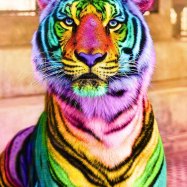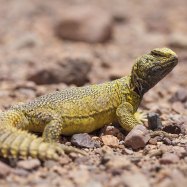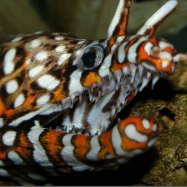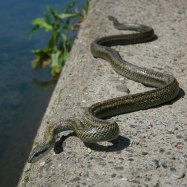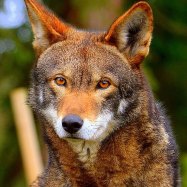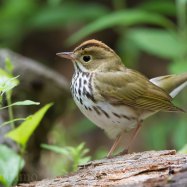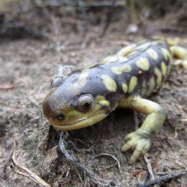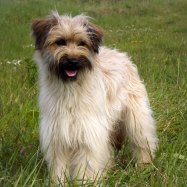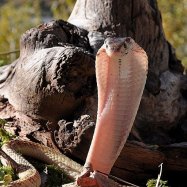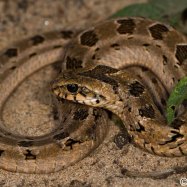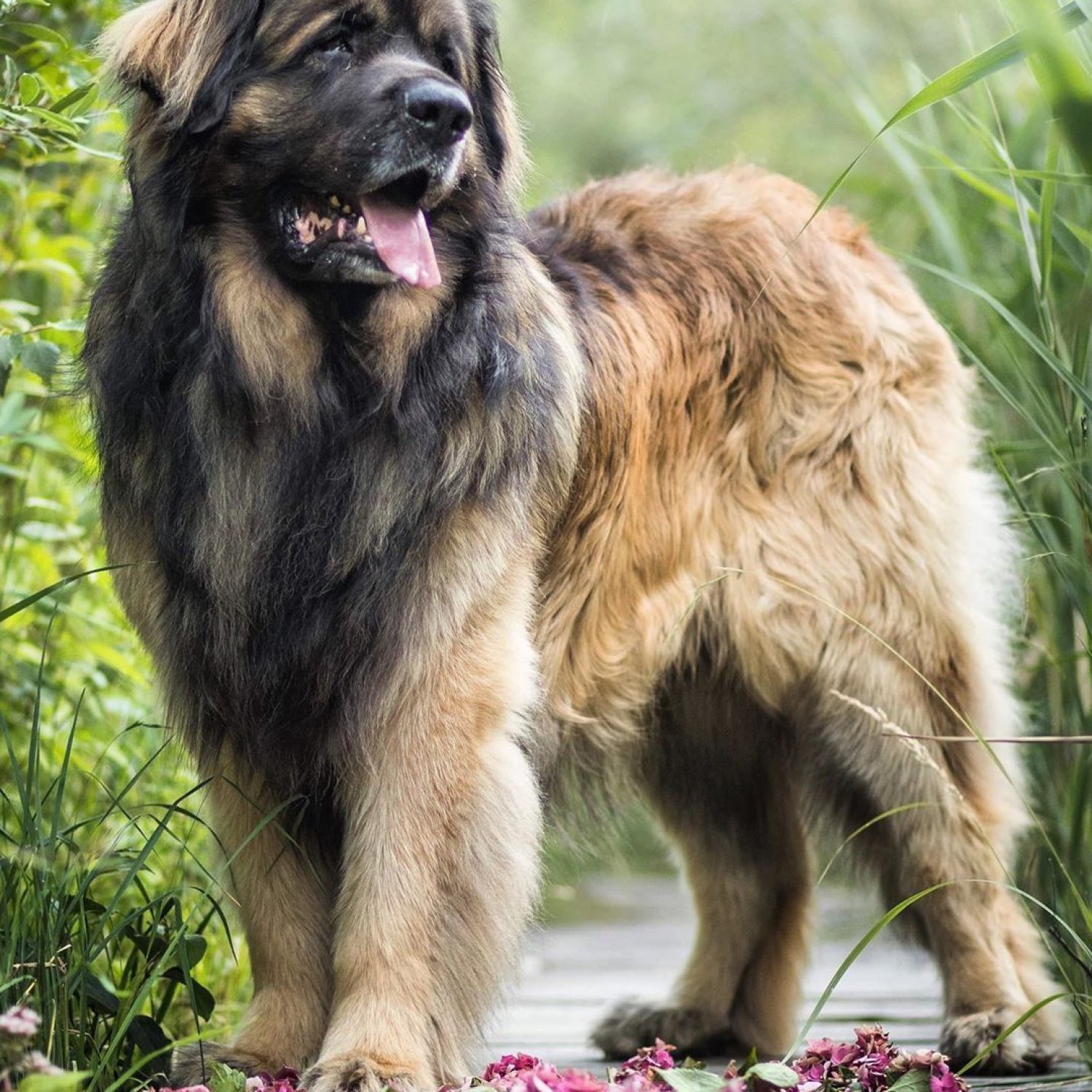
Leonberger
65-80 centimeters
The Leonberger, a large and strong dog breed from Europe, is known for its calm and loving nature. With an impressive length of 65-80 centimeters, this member of the Canidae family makes for a great companion and a vigilant guard dog. Its thick coat and abundant mane give it a regal appearance, earning it the nickname lion dog. #Animals #Leonberger #Canidae
Animal Details Summary:
Common Name: Leonberger
Kingdom: Animalia
Habitat: Various, prefer rural or suburban areas
The Majestic Leonberger: A Gentle Giant Among Dogs
From ancient Rome to modern Europe, the Leonberger has captured the hearts of dog lovers with its impressive size, distinct coloring, and gentle demeanor. Often described as a "gentle giant," this magnificent breed is a perfect combination of strength and kindness. In this article, we will delve into the fascinating world of the Leonberger – from its origins to its unique characteristics, making it a beloved breed among dog enthusiasts.A Brief History of the Leonberger
As the name suggests, the Leonberger originated in the city of Leonberg, Germany, in the mid-19th century Leonberger. The breed was created by Heinrich Essig, a politician and entrepreneur, by crossing a Newfoundland with a Saint Bernard. Essig's goal was to develop a versatile, large, and powerful breed that could serve as a guard dog, draft dog, and companion.The Leonberger quickly gained popularity among the European aristocracy and nobility, including Empress Elizabeth of Austria and Napoleon III, who were often seen with their beloved Leonbergers by their side. However, the breed faced near extinction during World War I due to its popularity among aristocrats, who were unable to maintain their dogs during the war. It wasn't until the 1960s that a dedicated group of breed enthusiasts revived the Leonberger and brought it back to its former glory.
Physical Appearance and Characteristics
The Leonberger is a large, muscular, and well-balanced breed that exudes strength and elegance. Males can grow up to 80 centimeters in height and weigh between 120-170 pounds, while females are slightly smaller, reaching heights of up to 75 centimeters and weighing between 100-135 pounds.One of the most distinctive features of the Leonberger is its coat, which comes in varying shades of golden, red, or brown with a black mask on the face. They have a thick, water-resistant double coat, which enables them to withstand harsh weather conditions, making them excellent outdoor dogs Labahoula. Regular grooming is necessary to keep their coat in top shape, but their luxurious mane and lion-like appearance make it worth the effort.
A Temperament That Matches Its Size
Despite its impressive size, the Leonberger is known for its gentle and loving temperament. They are loyal, devoted, and protective of their families, making them excellent guard dogs. Their calm and tolerant nature makes them perfect for families with children and other pets.Leonbergers are also known for their intelligence and are eager to please their owners, making them easy to train. Their laid-back attitude also makes them suitable for first-time dog owners, as long as they are committed to providing them with proper training, socialization, and exercise.
Living and Feeding
Leonbergers are adaptable and can thrive in various environments, including rural and suburban settings. However, they do prefer to have some outdoor space to roam and explore. This breed requires a moderate amount of exercise, including daily walks and playtime, to keep them mentally and physically stimulated.Being a carnivorous animal, the Leonberger's diet should consist of high-quality, protein-rich food. It is essential to monitor their food intake, as their large size and love for food can make them prone to obesity. Consult with a veterinarian to determine the amount and type of food that best suits your dog's needs.
A Worldwide Presence
While the Leonberger originated in Germany, it has gained worldwide recognition and popularity. These majestic dogs can be found in various countries, including the United States, Canada, Australia, and many European countries. They have also been used in search and rescue operations worldwide due to their strength, agility, and intelligence.The Future of the Leonberger
Despite facing near extinction during World War I, the Leonberger has made a remarkable comeback, and its future looks bright. The breed is recognized by various kennel clubs, including the American Kennel Club, and is in high demand among dog enthusiasts.However, as with any purebred animal, there are concerns about genetic health issues. It is crucial for breeders to conduct thorough health screenings to ensure the dogs' overall well-being and prevent any inherited health problems. Responsible breeding practices will ensure the continued success and preservation of this magnificent breed.
In Conclusion
The Leonberger is truly a unique and impressive breed, with a rich history and a devoted following worldwide. Its gentle nature and impressive appearance make it a beloved family pet and a versatile working dog. As long as they receive proper love, care, and attention, the Leonberger will continue to enrich the lives of those fortunate enough to have them as companions. So, if you're looking for a loyal and affectionate dog that will capture your heart, the Leonberger might just be the perfect pet for you.

Leonberger
Animal Details Leonberger - Scientific Name: Canis lupus familiaris
- Category: Animals L
- Scientific Name: Canis lupus familiaris
- Common Name: Leonberger
- Kingdom: Animalia
- Phylum: Chordata
- Class: Mammalia
- Order: Carnivora
- Family: Canidae
- Habitat: Various, prefer rural or suburban areas
- Feeding Method: Carnivorous
- Geographical Distribution: Worldwide
- Country of Origin: Germany
- Location: Europe
- Animal Coloration: Golden, red, or brown with a black mask on the face
- Body Shape: Large and strong
- Length: 65-80 centimeters
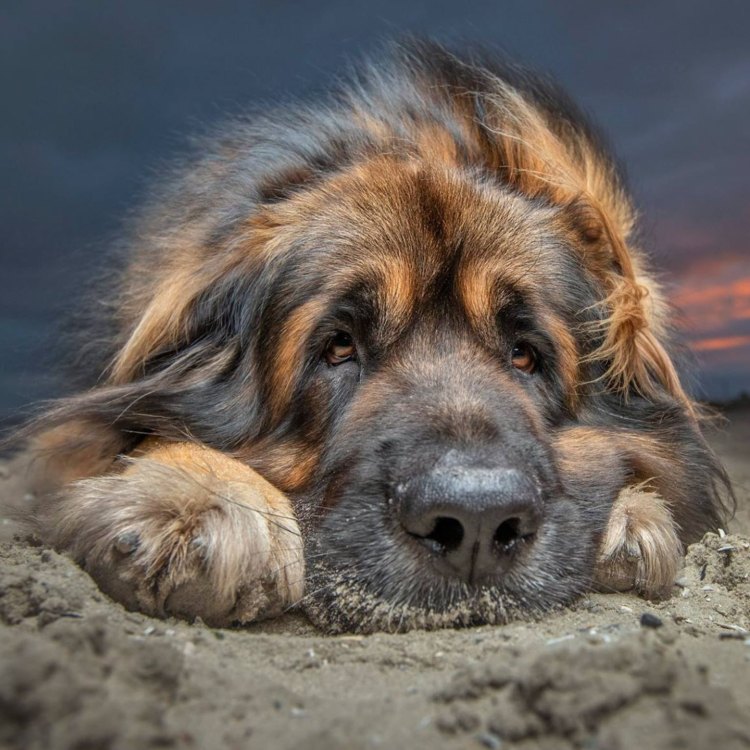
Leonberger
- Adult Size: Male: 71-80 centimeters, Female: 65-75 centimeters
- Average Lifespan: 9-11 years
- Reproduction: Sexual
- Reproductive Behavior: Year-round breeding with a gestation period of about 9 weeks
- Sound or Call: Deep and powerful bark
- Migration Pattern: Non-migratory
- Social Groups: Pack
- Behavior: Friendly, gentle, and good-natured
- Threats: None significant
- Conservation Status: Not applicable (Domesticated)
- Impact on Ecosystem: Not applicable
- Human Use: Companion dogs, therapy dogs
- Distinctive Features: Large size, gentle expression, lion-like appearance
- Interesting Facts: Named after the city of Leonberg in Germany, bred to resemble a lion
- Predator: None significant
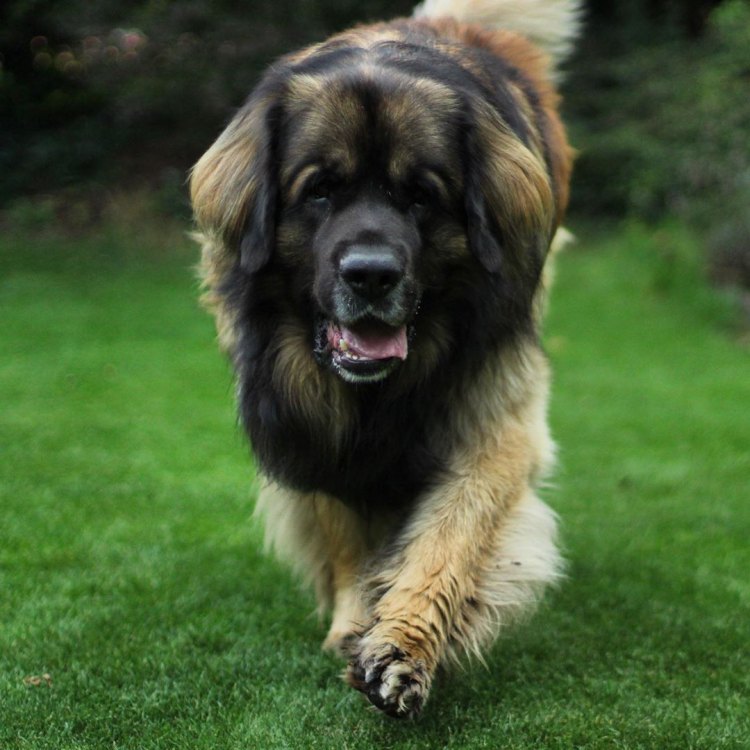
Canis lupus familiaris
The Graceful Giant: The Fascinating World of Leonbergers
The world of dog breeding is full of diverse and unique breeds, each with its own distinct characteristics. One such breed that has captured the hearts of many is the Leonberger. Known for its impressive size and gentle nature, the Leonberger is a majestic and beloved dog that continues to awe and amaze dog lovers around the world.The Leonberger, also known as the "Leo," is a large breed of dog that originated in Germany in the 19th century PeaceOfAnimals.Com. They were first bred in the town of Leonberg, hence their name, by Heinrich Essig who wanted to create a dog that resembled a lion in appearance. This vision led to the creation of a gentle giant, praised for its strength and docile nature.
The Leonberger is an imposing dog, with male adults reaching a height of 71-80 centimeters and females ranging from 65-75 centimeters. They can weigh up to 170 pounds, making them one of the largest domesticated breeds. Despite their size, they have a gentle expression that complements their friendly disposition.
On average, Leonbergers have a lifespan of 9-11 years. This is relatively short compared to other large breeds, but they make up for it with their loyal and loving nature. They mature slowly, physically and mentally, which contributes to their longer puppyhood and their friendly and laid-back personalities.
When it comes to reproduction, Leonbergers, like most domesticated dogs, are sexual Lesser Jacana. They have year-round breeding with a gestation period of about 9 weeks. This means that even though they may not show any behavioral signs of being in heat, they are still capable of breeding. As such, it is essential for responsible breeders to carefully plan and monitor their breeding to maintain the health and quality of the breed.
Leonbergers are not known for their vocalizations, but when they do bark, it is a deep and powerful sound. They are not prone to excessive barking, making them suitable for apartment living. However, their size and strength make them better suited for a home with a yard where they can run and play freely.
Another interesting fact about Leonbergers is their migration pattern. Unlike some dog breeds that are known for their migratory nature, Leonbergers are non-migratory. This means that they do not have the instinctual desire to travel long distances, as they prefer to stay close to their pack, which is typically their human family.
Speaking of packs, Leonbergers are social animals and thrive in a pack or family environment. They are pack-oriented and need human company, whether it's their human family or a group of friends. They are not ideal for owners who spend long hours at work or those who prefer a solitary lifestyle. These gentle giants crave human companionship and will go to great lengths to be close to their loved ones.
One of the most outstanding characteristics of Leonbergers is their behavior. They are known for their friendly, gentle, and good-natured personalities. They are social dogs and love to interact with people of all ages. This trait makes them natural therapy dogs, bringing joy and comfort to the sick and elderly.
Leonbergers are also known for their patience, making them excellent dogs for families with children. They can withstand children's playful and sometimes rough behavior, and their size adds an extra layer of protection. However, as with any dog, it is essential to teach children how to interact safely and respectfully with animals.
One of the remarkable things about Leonbergers is that they are not known to face any significant threats in their natural habitat or as domesticated pets. As such, they are not on any list for a conservation status. Their docile nature and lack of aggressive tendencies make them a low-risk breed, but it is still necessary to provide proper socialization and training to ensure they remain calm and well-behaved.
When it comes to human use, Leonbergers serve as excellent companion dogs. Their friendly nature and gentle demeanor make them ideal for families or individuals looking for a loyal and loving pet. These magnificent dogs also excel as therapy dogs, providing comfort and emotional support in hospitals, nursing homes, and other care facilities.
Leonbergers have distinct features that make them stand out from other breeds. Their large size alone is enough to catch anyone's attention. They have a thick double coat that comes in various shades of yellow, red, and brown, with a black mask on their face. Their soft, bushy fur and lion-like appearance make them resemble their namesake and attract many admirers.
While we may think of dogs as domesticated animals, their instincts and characteristics often align with their wild counterparts. However, this is not the case for Leonbergers. Due to their size and docile nature, they do not have a significant impact on the ecosystem. They are not known to prey on smaller animals, and they coexist peacefully with other pets in the household.
In conclusion, the Leonberger is an extraordinary breed that continues to fascinate and amaze dog lovers worldwide. Their distinct features, friendly nature, and noble appearance make them a favorite among many. Their playful and affectionate personality coupled with their gentle and patient demeanor make them ideal pets for individuals and families alike. As they say, good things come in big packages, and that couldn't be truer for the majestic and graceful Leonberger.
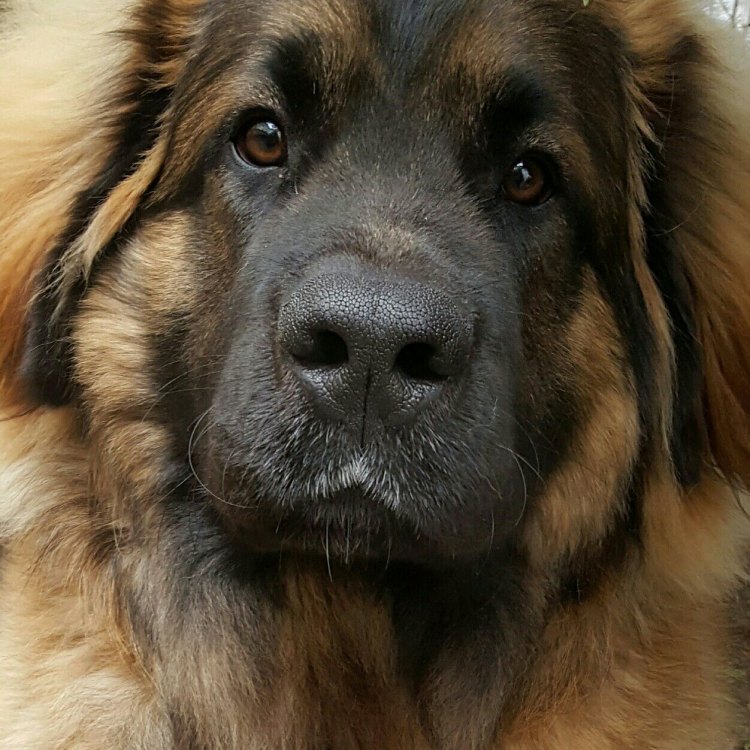
The Majestic Leonberger: A Gentle Giant Among Dogs
Disclaimer: The content provided is for informational purposes only. We cannot guarantee the accuracy of the information on this page 100%. All information provided here may change without prior notice.

